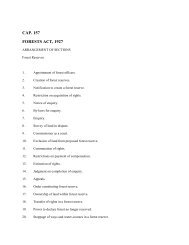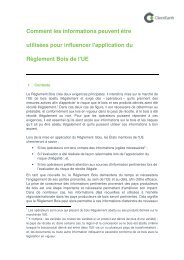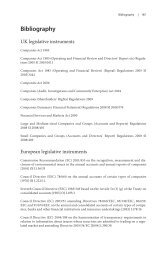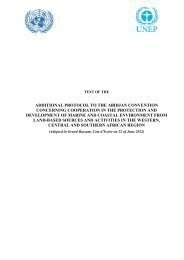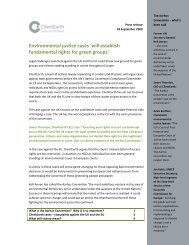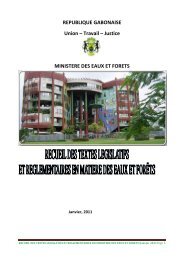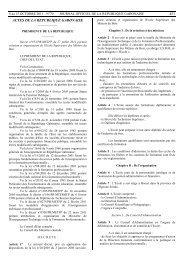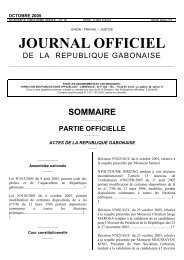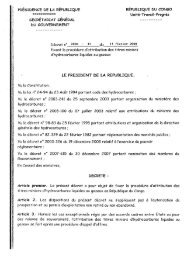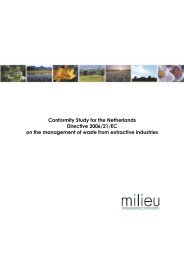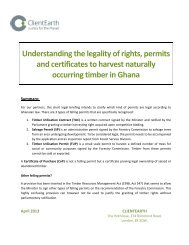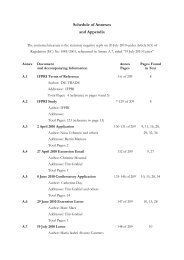Environmental and social transparency under the ... - ClientEarth
Environmental and social transparency under the ... - ClientEarth
Environmental and social transparency under the ... - ClientEarth
- No tags were found...
You also want an ePaper? Increase the reach of your titles
YUMPU automatically turns print PDFs into web optimized ePapers that Google loves.
136 | <strong>Environmental</strong> <strong>and</strong> <strong>social</strong> <strong>transparency</strong> <strong>under</strong> <strong>the</strong> Companies Act 2006Annex 6: UK law governing company AGMs | 137means a general meeting of <strong>the</strong> company at which <strong>the</strong> company’s annual accounts<strong>and</strong> reports are (or are to be) laid in accordance with this section.The Companies Act 2006 requires that <strong>the</strong> annual accounts <strong>and</strong> reportsmust be ‘laid’ before <strong>the</strong> company in general meeting, which in practicewill be <strong>the</strong> AGM. There is no legal requirement that <strong>the</strong> annual reportsneed <strong>the</strong> shareholders’ approval or acceptance. Shareholders have no legalright to reject <strong>the</strong>m. 342 Fur<strong>the</strong>rmore, <strong>the</strong>re is no explicit provision in lawor guidance as to what <strong>the</strong> process of ‘laying’ <strong>the</strong> reports involves; whe<strong>the</strong>r<strong>the</strong>re must be <strong>the</strong> opportunity for specific discussion of <strong>the</strong> accounts orreports. However, in practice <strong>the</strong>re will always be <strong>the</strong> opportunity fordiscussion of <strong>the</strong> reports at <strong>the</strong> AGM.As discussed in <strong>the</strong> main body of this review, <strong>the</strong> AGM constitutes oneof <strong>the</strong> key opportunities for <strong>the</strong> annual accounts <strong>and</strong> reports prepared bycompany directors to be scrutinized, <strong>and</strong> <strong>the</strong> main opportunity for shareholdersto ask questions to clarify <strong>and</strong> ensure <strong>the</strong> accuracy <strong>and</strong> proprietyof reporting. This is extremely important for <strong>the</strong> proper internal workingsof <strong>the</strong> company. It is needed to ensure <strong>transparency</strong> between directors<strong>and</strong> shareholders, to encourage shareholders to be engaged <strong>and</strong> informed,<strong>and</strong> to provide <strong>the</strong> opportunity for shareholders to exercise control over<strong>the</strong>ir investment <strong>and</strong> <strong>the</strong> future of <strong>the</strong> company.A.6.2.2 ResolutionsAt AGMs, resolutions are put to <strong>the</strong> shareholders for voting, on all mannerof company activities. Resolutions provide an opportunity for environmental<strong>and</strong> <strong>social</strong> matters associated with a company’s activities to bediscussed at <strong>the</strong> AGM. 343s338 Public companies: members’ power to require circulation of resolutions forAGMs(1) The members of a public company may require <strong>the</strong> company to give, to membersof <strong>the</strong> company entitled to receive notice of <strong>the</strong> next annual general meeting,notice of a resolution which may properly be moved <strong>and</strong> is intended to be movedat that meeting.(2) A resolution may properly be moved at an annual general meeting unless—(a) it would, if passed, be ineffective (whe<strong>the</strong>r by reason of inconsistency withany enactment or <strong>the</strong> company’s constitution or o<strong>the</strong>rwise),(b) it is defamatory of any person, or(c) it is frivolous or vexatious.(3) A company is required to give notice of a resolution once it has received requeststhat it do so from—(a) members representing at least 5% of <strong>the</strong> total voting rights of all <strong>the</strong> memberswho have a right to vote on <strong>the</strong> resolution at <strong>the</strong> annual general meetingto which <strong>the</strong> requests relate (excluding any voting rights attached to anyshares in <strong>the</strong> company held as treasury shares), or(b) at least 100 members who have a right to vote on <strong>the</strong> resolution at <strong>the</strong> annualgeneral meeting to which <strong>the</strong> requests relate <strong>and</strong> hold shares in <strong>the</strong> companyon which <strong>the</strong>re has been paid up an average sum, per member, of atleast £100.See also section 153 (exercise of rights where shares held on behalf of o<strong>the</strong>rs).(4) A request—(a) may be in hard copy form or in electronic form,(b) must identify <strong>the</strong> resolution of which notice is to be given,(c) must be au<strong>the</strong>nticated by <strong>the</strong> person or persons making it, <strong>and</strong>(d) must be received by <strong>the</strong> company not later than—(i) 6 weeks before <strong>the</strong> annual general meeting to which <strong>the</strong> requestsrelate, or(ii) if later, <strong>the</strong> time at which notice is given of that meeting.s314 Members’ power to require circulation of statements(1) The members of a company may require <strong>the</strong> company to circulate, to membersof <strong>the</strong> company entitled to receive notice of a general meeting, a statement of notmore than 1,000 words with respect to—(a) a matter referred to in a proposed resolution to be dealt with at that meeting,or(b) o<strong>the</strong>r business to be dealt with at that meeting.(2) A company is required to circulate a statement once it has received requests to doso from—(a) members representing at least 5% of <strong>the</strong> total voting rights of all <strong>the</strong> memberswho have a relevant right to vote (excluding any voting rights attachedto any shares in <strong>the</strong> company held as treasury shares), or(b) at least 100 members who have a relevant right to vote <strong>and</strong> hold shares in<strong>the</strong> company on which <strong>the</strong>re has been paid up an average sum, per member,of at least £100.See also section 153 (exercise of rights where shares held on behalf of o<strong>the</strong>rs).(3) In subsection (2), a “relevant right to vote” means—(a) in relation to a statement with respect to a matter referred to in a proposedresolution, a right to vote on that resolution at <strong>the</strong> meeting to which <strong>the</strong>requests relate, <strong>and</strong>(b) in relation to any o<strong>the</strong>r statement, a right to vote at <strong>the</strong> meeting to which<strong>the</strong> requests relate.(4) A request—(a) may be in hard copy form or in electronic form,(b) must identify <strong>the</strong> statement to be circulated,(c) must be au<strong>the</strong>nticated by <strong>the</strong> person or persons making it, <strong>and</strong>(d) must be received by <strong>the</strong> company at least one week before <strong>the</strong> meeting towhich it relates.



